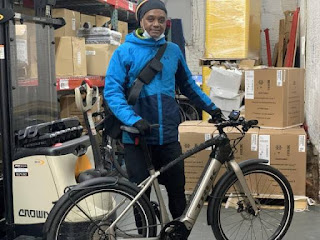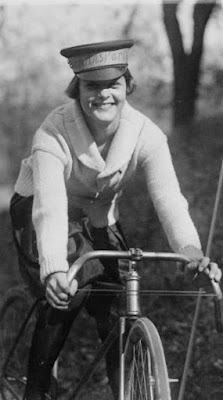Yesterday, while waiting on the supermarket line, a second register opened. A customer stepped up to it; a couple of people on the line grumbled. But a man who stood behind me reminded them, "They were ahead of us."
Hearing that, I was reminded of how "they" has become acceptable as a gender-neutral singular pronoun. I can recall, years ago, the chair (actually, at that time, chairman) of the department in which I taught castigated a colleague for using "they" in that way. "But we don't know whether it's a guy or girl," she protested. Ever the fusty one, that chairman reminded that colleague, in one of the most condescending tones I've ever heard, that "they" is plural.
Of course, that locution hasn't made its way into most formal writing. Nor has the use of "their" for "his or her." I believe, however, that it, and "they" will, unless someone comes up with useful, roll-off-the-tongue, gender-neutral singular substitutes for "him or her," "he or she" and "his or her."
Perhaps I pay more attention than most other people do to such things because I've taught English--and am a transgender woman. Because I identify as a woman, I go by feminine pronouns. But I also understand, better than most people (if I do say so myself), why someone who doesn't identify on either side of the gender binary would use "they" and "their" in the absence of other gender-neutral pronouns one can use to reference one's self.
I am happy that terms referring to cyclists and cycling are, mainly, gender-neutral, at least in English. But I remember working in my first bike shop and hearing an older mechanic referring to "male" and "female" parts--and noticing that while some shops had a female sales person or even manager, the industry and sport were overwhelmingly male-dominated.
Before that, I held two titles, if you will, that are particularly ironic, given how I now live. During my Brooklyn childhood, I was an altar boy. Today they're called "altar servers" but in the years just after Vatican II, girls weren't allowed on the altar--except to get married. (At least, that's my understanding of how things were in the Roman Catholic church of the time.) As incongruous as the title and role seem to me now, I have to admit that, at the time, I enjoyed the experience: In a community where most of us attended the same church, and many of us the same Catholic school, altar boys were held in an esteem few other kids enjoyed. Also, the church sponsored events for us: We went to shows, ballgames, amusement parks and the like. Those experiences, I think, helped to form some of my earliest friendships.
A couple of years later, after my family moved to New Jersey, I became a paperboy or, if you like, newsboy for the Asbury Park Press. Although some women (including, for a time, my mother) delivered bundles of newspapers to paperboys, it was unheard-of for girls to deliver an individual copy to someone's mailbox or doorstep. When the newsboy with one of the Press's largest routes "retired" (he graduated high school and joined the Army), the folks in the Press office "weren't sure" that it "would be OK" for a girl to take over. But a few people, including my mother, managed to convince them that the girl in question would be a capable replacement--and she was.
I enjoyed darting down the streets and winding through the cul-de-sacs of Port Monmouth and New Monmouth, a sack of papers slung across my body, on my Schwinn Continental. For one thing, I was getting paid to ride my bike. For another, I felt free: I had no other imperative but to be sure that when people came home from work or picking up their kids, a copy of the newspaper was in their mailbox, doorway or wherever else they wanted to find it.
It didn't matter that I wasn't the best-looking, most popular or smartest kid in the class--or even what my gender identity or sexual orientation might have been. All that mattered was that people got their copies of the Asbury Park Press. That, of course, was the appeal being a New York City messenger would, years later, hold for me: Nobody cared whether I could "fit in" as long as they got their papers and packages.
Given who I am--more specifically, how I've become who I am--it is indeed ironic that I once worked and identified as a paperboy. Believe it or not, it's even stranger to see someone else, who's never identified as anything but male, to so identify himself.
 |
| George Bailey, paperboy |
Every morning, George Bailey delivers copies of the Daily Mail in Headcorn, the southeastern England village where he lives. It's not his first job: Before taking up the route, he worked at a local golf course, for a food manufacturer and a stockbroker. Yes, you read that right. Oh, and he did those things after working a paper round for the first time, starting at age 11.
Now he's 80, and still refers to himself as a "paperboy." He returned to making deliveries as a pensioner, but recently considered "retiring" from it. That is, until he made headlines and someone folks from Evans Cycles and Raleigh heard about them. Together, they donated an e-bike to him. "Offering a little electrical assistance when needed," e-bikes "increase enjoyment and ultimately encourage riders to ride more often," said David Greeenwood of Evans Cycles.
Of the e-bike, Bailey said, "It's given me a new lease on life." Now that he's using it, "I might even still be doing this when I'm 90."
If he is, will he still be referring to himself as a "paperboy?"






















